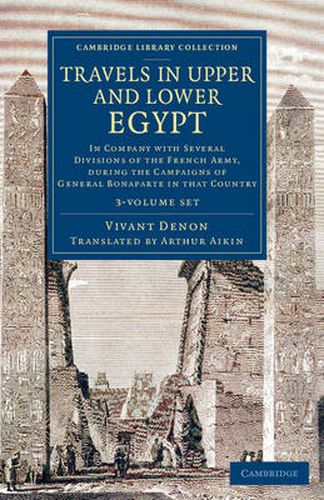Readings Newsletter
Become a Readings Member to make your shopping experience even easier.
Sign in or sign up for free!
You’re not far away from qualifying for FREE standard shipping within Australia
You’ve qualified for FREE standard shipping within Australia
The cart is loading…






Napoleon’s military expedition to Egypt in 1798 famously included various scientists and savants, among whom was the author of this three-volume work, published in French in 1802 and in English in 1803. Vivant Denon (1747-1825) was a dilettante and diplomat under the Ancien Regime, but survived the Revolution thanks to the patronage of the painter David, and met Napoleon through the salon of Josephine de Beauharnais. He accompanied the army, excavating and sketching, sometimes even during battles. The publication of this lively, illustrated account is regarded as the chief stimulus for the so-called ‘Egyptian Revival’ style of architecture, interior design and even costume. The work is dedicated to Napoleon, and the translator, Arthur Aikin, remarks in his ‘Advertisement’, that ‘It is presumed that an account, by an eye-witness, of the romantic but unprovoked invasion of Egypt by General Bonaparte, will not be uninteresting to the British Public.
$9.00 standard shipping within Australia
FREE standard shipping within Australia for orders over $100.00
Express & International shipping calculated at checkout
Napoleon’s military expedition to Egypt in 1798 famously included various scientists and savants, among whom was the author of this three-volume work, published in French in 1802 and in English in 1803. Vivant Denon (1747-1825) was a dilettante and diplomat under the Ancien Regime, but survived the Revolution thanks to the patronage of the painter David, and met Napoleon through the salon of Josephine de Beauharnais. He accompanied the army, excavating and sketching, sometimes even during battles. The publication of this lively, illustrated account is regarded as the chief stimulus for the so-called ‘Egyptian Revival’ style of architecture, interior design and even costume. The work is dedicated to Napoleon, and the translator, Arthur Aikin, remarks in his ‘Advertisement’, that ‘It is presumed that an account, by an eye-witness, of the romantic but unprovoked invasion of Egypt by General Bonaparte, will not be uninteresting to the British Public.